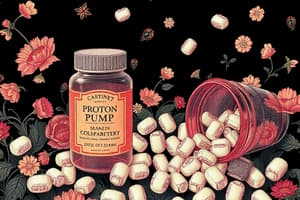Podcast
Questions and Answers
What are the different types of esophageal GERD syndromes?
What are the different types of esophageal GERD syndromes?
- Esophagitis and Barrett’s esophagus (correct)
- Chronic cough and laryngitis
- Typical and alarm
- Symptom-based and extraesophageal
Which symptoms mandate further diagnostic evaluation in GERD?
Which symptoms mandate further diagnostic evaluation in GERD?
- Chronic cough and laryngitis
- Weight loss and dysphagia (correct)
- Esophagitis and strictures
- Typical and alarm
What are the risk factors that can predispose a patient to GERD?
What are the risk factors that can predispose a patient to GERD?
- Chronic cough and laryngitis
- Barrett’s esophagus and esophageal adenocarcinoma
- Alcohol and obesity (correct)
- Esophagitis and strictures
What is the goal of treating a patient with GERD?
What is the goal of treating a patient with GERD?
What are the benefits of proton pump inhibitors over H2-receptor antagonists in the treatment of moderate-to-severe GERD?
What are the benefits of proton pump inhibitors over H2-receptor antagonists in the treatment of moderate-to-severe GERD?
What should be monitored for potential adverse drug reactions associated with GERD therapies?
What should be monitored for potential adverse drug reactions associated with GERD therapies?
When is maintenance therapy indicated in a patient with GERD?
When is maintenance therapy indicated in a patient with GERD?
What is the main cause of GERD?
What is the main cause of GERD?
Which of the following is a symptom of GERD?
Which of the following is a symptom of GERD?
How is GERD diagnosed?
How is GERD diagnosed?
What are the treatment options for mild GERD?
What are the treatment options for mild GERD?
What percentage of adults in North America experience weekly GERD symptoms?
What percentage of adults in North America experience weekly GERD symptoms?
What is the aim of GERD treatment?
What is the aim of GERD treatment?
What are the risk factors for GERD?
What are the risk factors for GERD?
What is a potential limitation of using sucralafate in GERD?
What is a potential limitation of using sucralafate in GERD?
Which medication may be considered for mild, endoscopic-negative GERD?
Which medication may be considered for mild, endoscopic-negative GERD?
What is recommended for patients with extraesophageal symptoms and concurrent typical GERD symptoms?
What is recommended for patients with extraesophageal symptoms and concurrent typical GERD symptoms?
What should be performed before committing to lifetime PPI use for patients who cannot discontinue the medication?
What should be performed before committing to lifetime PPI use for patients who cannot discontinue the medication?
What is a potential role in refractory GERD, depending on patient-specific factors?
What is a potential role in refractory GERD, depending on patient-specific factors?
What should be considered in patients who have not responded to BID PPI therapy for 12 weeks?
What should be considered in patients who have not responded to BID PPI therapy for 12 weeks?
What is generally indicated for patients who respond to a PPI trial or have endoscopic evidence of reflux?
What is generally indicated for patients who respond to a PPI trial or have endoscopic evidence of reflux?
What should be carefully considered before prescribing acid suppression therapy to infants?
What should be carefully considered before prescribing acid suppression therapy to infants?
What should be evaluated regularly in patients using PPIs?
What should be evaluated regularly in patients using PPIs?
Which class of medications provides the greatest symptom relief and the highest healing rates for patients with erosive disease, moderate-to-severe symptoms, or complications?
Which class of medications provides the greatest symptom relief and the highest healing rates for patients with erosive disease, moderate-to-severe symptoms, or complications?
What is the enzyme responsible for the conversion of clopidogrel from prodrug to active ingredient and is strongly inhibited by omeprazole?
What is the enzyme responsible for the conversion of clopidogrel from prodrug to active ingredient and is strongly inhibited by omeprazole?
Which medication increases Lower Esophageal Sphincter (LES) pressure in a dose-related manner by accelerating gastric emptying?
Which medication increases Lower Esophageal Sphincter (LES) pressure in a dose-related manner by accelerating gastric emptying?
Which medication may inhibit the metabolism of warfarin, theophylline, phenytoin, nifedipine, propranolol, and others?
Which medication may inhibit the metabolism of warfarin, theophylline, phenytoin, nifedipine, propranolol, and others?
What are potential drug-drug interactions with antacids include?
What are potential drug-drug interactions with antacids include?
How do Proton Pump Inhibitors (PPIs) work to provide symptomatic relief?
How do Proton Pump Inhibitors (PPIs) work to provide symptomatic relief?
What kind of patients should PPIs be discontinued in or have the dosage lowered after an empirical trial due to rebound acid hypersecretion when used for >8 weeks?
What kind of patients should PPIs be discontinued in or have the dosage lowered after an empirical trial due to rebound acid hypersecretion when used for >8 weeks?
Flashcards are hidden until you start studying
Study Notes
- Antacids provide symptomatic relief by increasing gastric pH, but documentation in placebo-controlled trials is lacking.
- Potential drug-drug interactions with antacids include tetracycline, iron, sulfonylureas, antibiotics, and H2RAs.
- Antacids are typically used on an as-needed basis, but OTC H2RAs and PPIs may also be used according to package directions.
- Patients with moderate but non-alarm symptoms may be prescribed medications for GERD if they fail patient-directed treatment.
- Proton Pump Inhibitors (PPIs) provide the greatest symptom relief and the highest healing rates, especially for patients with erosive disease, moderate-to-severe symptoms, or complications.
- PPIs work by inhibiting H+/K+-adenosine triphosphate in gastric parietal cells and maintaining extended time with gastric pH >4, which is correlated with the healing of erosive esophagitis.
- PPIs, such as dexlansoprazole, esomeprazole, lansoprazole, omeprazole, omeprazole and sodium bicarbonate, pantoprazole, and rabeprazole, are available in various forms.
- PPIs should be discontinued in patients with uncomplicated GERD or the dosage should be lowered after an empirical trial due to rebound acid hypersecretion when used for >8 weeks, making withdrawal difficult.
- Data is lacking on a proper tapering protocol and various approaches may be considered on a case-by-case basis.
- BID dosing in those not responding to a standard once daily course of therapy and swapping to an alternative PPI can provide similar efficacy.
- Common side effects include headache, diarrhea, nausea, and abdominal pain, and increasing concerns with PPI safety have been reported.
- PPIs interact with various medications and decreasing absorption of ketoconazole or itraconazole, and omeprazole strongly inhibits CYP2C19, which is the enzyme responsible for the conversion of clopidogrel from prodrug to active ingredient.
- Alternative options exist for pediatric patients and those unable to swallow tablets/capsules, including delayed-release capsules, granules, oral suspension packets, orally disintegrating tablets, capsule sprinkles, or IV formulations.
- Histamine2 Receptor Antagonists (H2RAs), such as cimetidine, famotidine, and nizatidine, have variable effectiveness in treating patients with mild to moderate GERD and often less than desired response.
- Disease severity, dosage regimen used, and duration of therapy all affect response, and agent selection should be patient-specific.
- Common adverse effects include headache, fatigue, dizziness, constipation/diarrhea, and cimetidine has many drug interactions and may inhibit the metabolism of warfarin, theophylline, phenytoin, nifedipine, propranolol, and others.
- Metoclopramide, a promotility agent, increases LES pressure in a dose-related manner by accelerating gastric emptying.
Studying That Suits You
Use AI to generate personalized quizzes and flashcards to suit your learning preferences.




